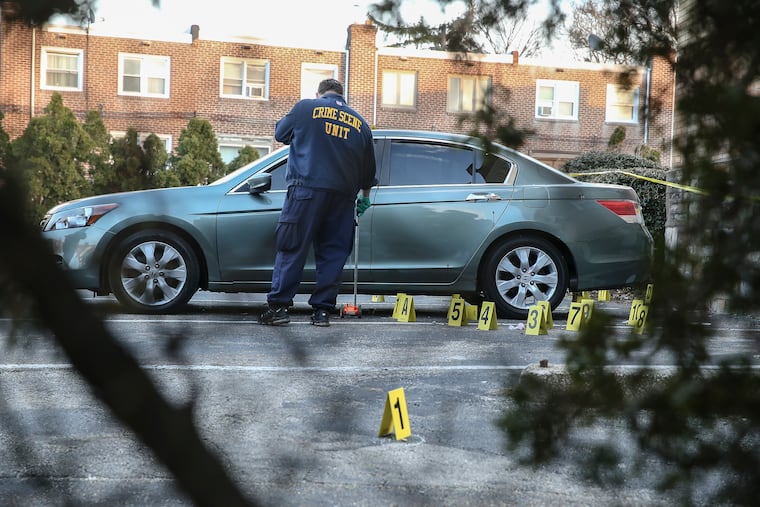Demand accountability where the people in power can’t ignore you | Helen Ubiñas
One man's hunger strikes against gun violence holds lessons that can't be ignored.

Jamal Johnson didn’t get much support during his first hunger strike against gun violence. At least not the kind that moved others to join him outside City Hall as he pressed Mayor Kenney to acknowledge and act on a resolution that called for the city to more urgently address the epidemic.
But day after day, then week after week, for nearly a month, the 64-year-old retired postal worker returned with his bullhorn.
He ended the strike on Feb. 12 — after the mayor finally found his way to him on a cold afternoon with lukewarm assurances — only to start a second hunger strike about two weeks later, when Johnson concluded that the mayor’s commitments didn’t add up to much.
About a week into his second hunger strike, a group of teens from Yeah Philly, a local youth empowerment organization, joined Johnson for a couple of hours. At one point, Johnson recalled, a young man asked him where the adults were:
“Mr. Jamal, you’re out here by yourself. … Where’s everybody at?”
The comment landed like a gut punch, stinging long after the teens left.
“What could I say?” he recalled later. “What could I say when they asked why the adults that they know and respect are not out here. I got to the point where I didn’t want to be embarrassed.”
On March 8, Johnson posted a video on Facebook announcing the end of his second hunger strike.
“Today I gave some serious thought to what I’m out here for,” he said into the camera, before turning it away from himself to show he was alone. “When I started this ... I felt that the city, especially the communities that I had helped, with others, over the years, I thought they were serious about this gun violence. ... Now I gotta be honest, I don’t know anymore if we are really serious about gun violence. … Or am I making a fool out of myself?”
Councilmember Jamie Gauthier, who introduced the resolution in September that called for routine public briefings on the city’s gun-violence prevention efforts, responded to the video.
“This saddens me,” she posted. “You know that I certainly think that your efforts are heroic. Thank you for standing up for all of us and demanding more urgent action on the violence ripping our communities apart.”
It saddened me, too. When we spoke this week, Johnson’s disappointment and frustration were as palpable as they were in his video.
“I know it comes off wrong and I know people think you shouldn’t judge other people, but my gosh, we got almost 100 people dead in this city, and everybody’s doing the same thing expecting a different result.”
To some, his comments may sound like sour grapes. His hunger strikes have been dismissed as a publicity stunt, and his criticisms as a knock on others working hard against gun violence.
But that’s not what I saw. When Johnson called out the community, he wasn’t trotting out the tired old trope in the way public officials do to deflect from their own failures.
He knows they are doing work — because he’s often in the mix with them.
But those marches and rallies and meetings are often held out of sight and earshot of the very people and institutions with the power to make necessary, urgent change, and instead are held in neighborhoods that know what’s at stake because they’re living through the carnage every day.
It’s why, out of all the antiviolence efforts I’ve covered over the years, one that still stands out is a 2019 three-day protest against the mounting number of unsolved murders held right outside police headquarters.
Too many people still get away with murder in this city, but for a few days, the protest got the right people’s attention and forced them to come down from their offices to look into the eyes of people left to suffer from their neglect.
That needs to happen more.
On Tuesday, 15-year-old Antonio Walker Jr. was fatally shot less than a week after the death of 15-year-old Embaba Mengesteabe.
On Thursday, four people were shot, two fatally. Later that same day, three teens were shot at a West Philadelphia recreation center, where a 16-year-old boy was killed.
In a statement, Kenney announced that his administration would finally begin regular public briefings about the efforts to curb violence.
Many will declare that a win — and it is, to a point. Except these small wins here and there aren’t enough.
In his video, Johnson, a military veteran, concluded that, “in any war you must assess your strategy, you must assess whether it’s working or not.”
He’s right.
One man can be put off or patronized.
One group can be dismissed, or worse, silenced or managed with a grant or a turn at the news conference lecterns that will never add up to collective change.
But it’s a whole hell of a lot harder to ignore an army of city residents who stand to fight together — at the front door of power.